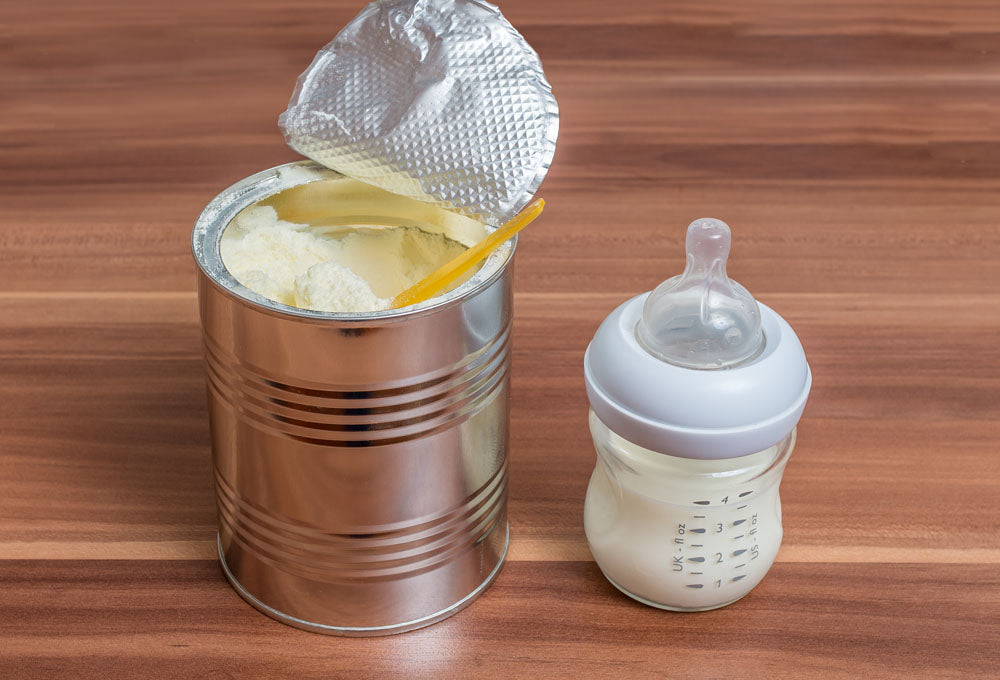Wanting to or need to feed your baby with formula milk? Lets cover the basics of what formula milk is and look at the different types so you can choose the right one for your baby.
What is formula milk?
Formula milk is made from cow’s milk but developed in a way which is suitable for babies and can be used until a baby is 1 year old when cows milk can be drunk. It comes in 2 different ways:
- A dry powder which is made up with water or
- Ready-made formula.
Formula provides nutrients essential for growth and development in those early years of life as long as it is prepared safely and used in the correct way. For more information about how to prepare formula safely visit First Steps Nutrition
There are so many options for parents to choose from and this can be very overwhelming if you haven’t had a baby before and you are trying to work out which one is best for your little one. Let’s look at the options that are available today.
Types of formula available.
The main ones we have are first milks, follow on milks, toddler milks and milks suitable for babies who have a lactose intolerance or a cow’s milk protein allergy (CMPA) (Please note that CMPA milks are only available via prescription and can’t be bought over the counter)
First Milks – aimed at birth to 6 months of age (however your baby can stay on these until 12 months of age)
These are formulas suitable for new-born babies. These are based on cow’s whey and casein which are proteins. Whey protein is considered to be more easily digestible than casein.
Manufacturers are very clever and will add titles to their first milk such as “Hungry Baby” in the hope that this will encourage parents to believe their milk will fill up their little ones more than standard first milk. However, there is no evidence at all that these milks offer any advantage. They don’t make babies full for longer, they don’t reduce waking or help them sleep through the night.
Milks which are marketed for hungry babies have more casein than whey in the protein mix and casein is harder for babies to digest. A baby has a tiny tummy and needs to eat little and often, day and night.
Comfort Milks – a first milk aimed at babies from birth to 12 months but must be used under medical supervision.
Another “enticing” title added by formula companies in the hope that parents will purchase their product and it may help “comfort” a crying baby or “settle their stomach”.
It is not uncommon for young babies to be unsettled or fussy in the evenings or cry more than they might at other times of the day. Frequent small feeds, responsive feeding and frequent winding (during and after feeds) is recommended. There is no consistent evidence that these “comfort milks” improve any wind, colic, fussiness or constipation.
Follow-on Formulas
These are formulas which are advertised as being “suitable from 6 months of age” and these are the ones you will see advertised on TV. Advertising of first milk formula’s is not allowed in the UK as the government are trying to promote breastfeeding. By using the term “follow on formula”, this allows them to advertise their products. There are no health-related advantages to moving onto follow on milk.
The Department of Health does not recommend that babies have to move onto follow-on milk at 6 months and that is why it is not possible to buy these milks with government-based voucher schemes. The advice is that parents and carers carry on with their first milk formulas for a year and then move to cow’s milk. The World Health Organisation state that the first milk infant formula is nutritionally closer to breastmilk than follow-on formula.
Goodnight Milks – a follow on milk aimed at 6 months to 3 years.
These are milks containing cereals such as rice and buckwheat and are advertised for babies over 6 months of age to 3 years. There is no research that suggests they help babies to sleep better and no evidence that the use of these milks offered any nutritional or health advantage.
Toddler milks and Growing Up Milks – aimed at children aged 1-3 years of age.
These milks contain more sugar than animal milk and may have the wrong balance of nutrients. Experts across Europe have agreed that young children don’t need these fortified milks to obtain particular nutrients. Children should get the majority of their nutrients from food at this age and giving a sweet milk drink to children can lead to excess sugar which is bad for teeth and our bodies in general.
Specialist formulas for babies with a Cow’s Milk Protein Allergy (CMPA)
CMPA is estimated to affect 1 in 20 babies under 1 but most will outgrow it as they get older.
CMPA can only be diagnosed and managed by your GP or a paediatrician and they will prescribe the formula most suitable for your baby. These are either an extensively hydrolysed formula or in more rare cases, an amino acid formula.
What are hydrolysed milks?
These are milks where the milk proteins (casein and whey) are broken down into smaller pieces so they are be absorbed more easily and more efficiently. Examples of brands which are used for babies with CMPA are Similac and Alimentum.
Amino-acid based formulas.
If your baby has severe CMPA, and they can’t even tolerate the hydrolysed formulas, a GP will prescribe an amino-acid based formula such as Neocate.
Amino acids are the building blocks of proteins and these are used to create these milks. As they don’t contain the actual proteins that the hydrolysed milks do, these are usually tolerated by babies who have severe CMPA.
Specific regulations around formula milks.
It is important to realise that all milks must meet specific regulations in terms of the composition of the milks. They must include proper amounts of water, carbohydrates, protein, fats, vitamins and mineral and each manufacturer must follow strict guidelines set by the government.
This means that all are fine to feed your baby (unless there is an allergy or intolerance) This also means that the more expensive brands, for example Aptimal First Milk is made in the same way as Aldi’s own brand Mamia. Aptimal is £14.50 for 800g tin and Aldi Mamia is £9.39 for a 900g tin!
Relax and don't Stress
Being a parent is not easy and feeling overwhelmed by the different brands of formula available can be quite stressful. If your baby is happy on the first milk you are giving them, then its ok to stay on this brand until they are a year old, and this is when you can move to cow’s milk in a bottle or a cup. By now, they should be getting the majority of their nutrition from food.






